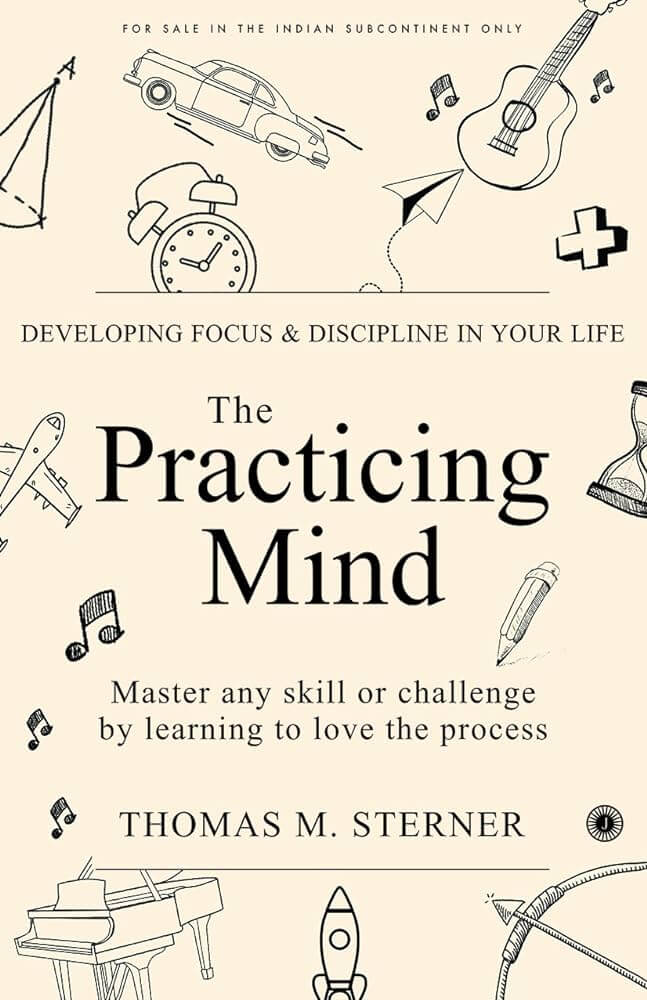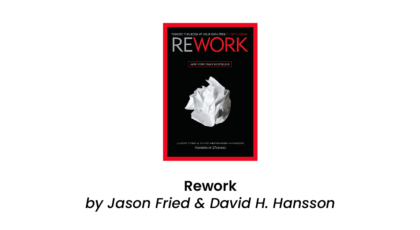Home » Blog » The Practicing Mind by Thomas M. Sterner: Notes & Summary
The Practicing Mind by Thomas M. Sterner: Notes & Summary

Habits make us while practicing makes those habits.
When I first stumbled upon The Practicing Mind by Thomas M Sterner, I thought this book was about boosting your brain’s grey cells or filling it with some brain exercises. Instead, after reading what I found is a concise book that advocates focusing on Process rather than having a Goal-oriented Mindset.
Though a common idea, Thomas has presented it beautifully, and I am sure anyone who reads the book will carry it for the long term.
In the novel, Thomas uses his life story and other resources to explain what happens when, instead of being Goal-driven, we start practicing without worrying about the result.
Applying it in daily life becomes very easy, so if you want to run a 5K marathon, start running. Or if you want to become a great cook, start cooking.
This theory doesn’t just only apply to gain skills but also to nurture yourself emotionally like, if you are prone to anger or easy to react, rather than changing already built-in bad habits, you slowly and steadily while practicing work on improving them.
In the book, he also covered key component points that complement Practicing Mind, like Mindfulness, Awareness, nonjudgmental, enjoying imperfection, etc.
My Notes on Practicing Mind By Thomas. M. Sterner
Chapter 1: The Learning Begins
- The desire to learn is only the first step.
- We need to know our internal process and rely on a practicing mind to avoid relying too much on false inspiration & motivation, which build unrealistic hope to achieve great things quickly.
- We are often conditioned (environment & technology) to form the habit of Multitasking.
- Practicing Mind = Calm, anxiety-free, & pinpoint-focused
- Without self-control and self-discipline, you have no power. A horse without a harness has no control over where it is going.
- As you get overwhelmed, you get comfortable in getting things slide.
- Building a Practicing Mindset will make you stop carrying any stress and anticipation & neither raise any internal questions.
Chapter 2: Process Not Product
- While practicing, you don’t have to accomplish anything; you have to be present and do the task.
- When we set unrealistic hopes, we feel anxiety. It only gets compounded.
- It’s a bad habit to make results our main goal instead of the process that helps in reaching that goal.
- We often focus on achieving the goal rather than completely present in attaining it.
- Practice and learning are similar but different.
- In practice, there is a presence of awareness and will. While in learning, it’s not.
- In practice, there are deliberate repetitions of process and intention to reach a goal – which are active in presence.
- Your desired goal is automatically achieved when you stay focused on the process.
- When you focus on a process, your awareness, mind, and thoughts are in “now,” while when you focus on some goal, your thoughts, energy and attention are not present, making you exhaust more energy than required.
- To be present in the process, we need to give up attachment to the end goal temporarily.
- When you start doing that, it gets too much pressure on you because now your goal or focus is to be present in doing what you are doing.
- Your final goal should be something other than an indicator of what you are doing.
- Judgement redirects and wastes our energy.
- Practicing the mind makes us more relaxed with others; this way, we start directing our energy on the activity which we are actively choosing to work on in the present.
- Every religion encourages us to stay in the present.
- For most people, problems stem from not focusing, and the biggest cause of that is when we humans rely too much emphasis on the end product rather than the process.
- World, Education system and other institutions don’t value process-oriented people. There is a push to score more marks to achieve higher grades, but no one emphasizes learning.
- Instant gratification, short-term satisfaction.
- Having a goal is less fulfilling than working towards it.
Chapter 3: It’s how you look at it
Chapter 4: Creating the habits we desire
- We need to develop an observer mindset within us. We should look at our thoughts without judgment or emotions.
- Expectation is tied to the result or product, the thought that things should be this way until “I won’t be happy.” If you are relying too much on getting results, consider that you have again started focusing on being goal-oriented rather than process-oriented.
- What we practice becomes our habit. To change our bad habits, we must start doing new ones more and more.
- To learn something new, relax, repeat the exercise and stay in the process. While practising, learning automatically happens.
Chapter 5: Perception Changes, Create Patience
- Impatience brings negative emotions.
- Experiencing patience is similar to not being in the present mode.
- Worrying = is when your mind anticipates circumstances that haven’t happened yet. Worrying exhaust our energy and fuel anxiety.
- What we worry about often never comes to pass.
- The more you start living in the present, the more you will realize the real you and your Ego’s internal dialogue.
- If you are impatient, comfort yourself by realizing there is no such thing as Perfection.
- True Perfection is constantly evolving and present within you, just like the flower.
- There is nothing in the world that is enough for you? Neither knowledge, money or other worldly things. Focusing on them will bring disappointment.
- There is no end when it comes to accomplishing or acquiring something.
- Progress is a natural result of staying focused on the process of doing anything.
- Cheating discipline doesn’t work.
- Achieving something without putting in any effort doesn’t bring any joy.
- The absolute joy lies in creating and sustaining the stamina and patience needed to work for something over time, not just acquire any worldly thing.
- Patience is just a natural outgrowth of your shifted perspective.
Chapter 6: The Four “S” Words
Use Simplify, Small, Short & Slow as four key driving factor to follow & maintain a practicing mind.
Simplify:
- When working on a new project or activity, simplify it by breaking it down into small actions.
- Set realistic goals, as unrealistic goals only create frustration.
- The more you attain a simple goal, the more motivation and happiness you have to continue.
Small:
- Break your main goal into small sections that can be achieved with a small amount of concentration.
Short:
- Make your goal time-bound. Set deadline.
- Use the Pomodoro technique.
Slow:
- Work at a pace that lets you pay attention to your actions.
Chapter 7: Equanimity & DOC
- Equanimity means even temperedness & calmness. And this art comes from being Non-judgmental.
- We judge everything in life; this judgmental attitude lets us make decisions.
- Usually our Judgements are based on some perceived ideals, biases, & opinions that we have formed.
- Judgements are vital for us to function in life, but they should be perceived from a “Detached Mind.”
- The emotion that you endure has nothing to do with execution, but it hinders you from thinking clearly and makes it harder for you to determine the best course of action.
- With Emotions, we decide to choose between either Good or Bad. If it’s good, it makes us happy; if it’s terrible, it makes us unhappy.
- In life, there is nothing constant. Similarly, our ideals, opinions, & perceptions are constantly changing.
- We cannot refine our life or part of our life if we are not detached from the process of doing it.
- When you are aligned with your true self, you are unaffected by others’ opinions of you.
- Observer mentality gives you clear, objective, & realistic expectations POV. Ego mentality persists in you to be “The best” all the time or make you an “I wanted it this way” person.
- Meditation builds observer mentality; observer mentality gives us detached wisdom.
- DOC=> Do observe, correct. DOC can be applied to any activity you are working on, but it works best in physical activity. Where you first take action, observe those actions, and finally correct them.
- In sports, DOC is a proven tactic that works, and like in sports, we can also make it part of our lives.
- Evaluating is not Judging; Evaluation is the process that comes before judgment. For this, you have to stop making judgments after doing DOC.
- DOC is a lifelong practice. You can’t perfect it in one go.



